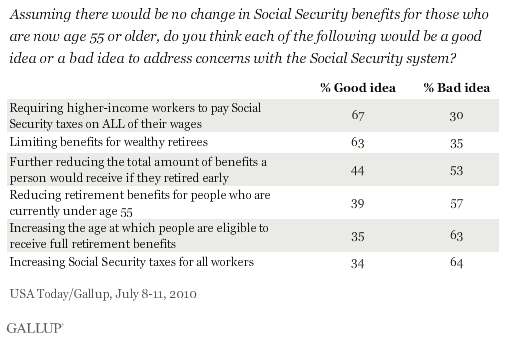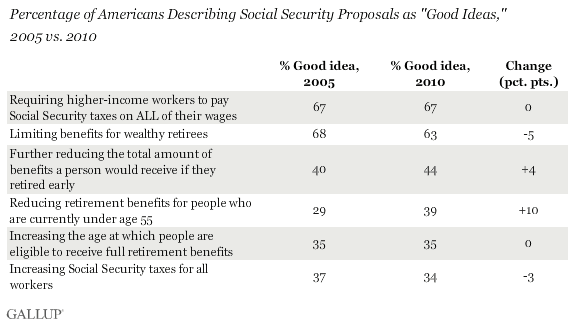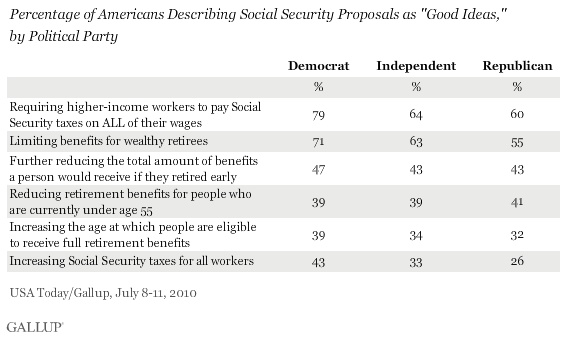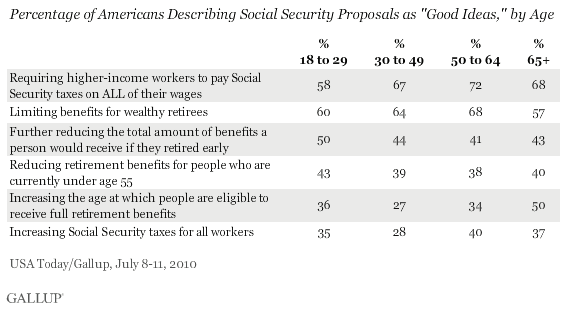PRINCETON, NJ -- Of six possible ways to address concerns with the Social Security system in a recent USA Today/Gallup poll, a majority of Americans favor two, both of which would affect only wealthy Americans. Less than a majority favor proposals that would involve increasing taxes, reducing benefits, or increasing the eligibility age for larger segments of the general public.

The July 8-11 USA Today/Gallup poll testing these ways to fix Social Security found growing doubts among both retired and nonretired Americans about the future of their own Social Security benefits. The poll also found the highest percentage of Americans in a Gallup survey to date saying the Social Security system is "in a state of crisis" or has "major problems."
The lack of support for most proposals to address problems with the Social Security system underscores the difficulty U.S. lawmakers will have in reforming it. Even the Democratic leaders in the U.S. House of Representatives are themselves divided on some of these, such as whether to raise the age at which people could receive full Social Security retirement benefits. Sixty-three percent of Americans believe this approach is a bad idea, making it (along with increasing Social Security taxes on all workers) the least popular of the six proposals tested in the poll.
Americans' opinions on various ways to ensure the future of Social Security have not changed much since 2005, when President Bush sought unsuccessfully to modify the system. At that time, as now, the proposals aimed at the wealthy were the only ones to garner majority support. Over the past five years, the only idea to receive a significant uptick in support is reducing retirement benefits for people currently under age 55, though still well less than a majority think this is a good idea.

There is general consensus on the Social Security proposals by age -- those that would primarily affect high-income Americans are the most popular among both young and old. The only notable difference by age concerns the idea of increasing the age at which people are eligible to receive full retirement benefits, which is endorsed by 50% of senior citizens but only 31% of all those under age 65. (For the full results by age, see page 2.)
Political differences exist on some, but not all, of the proposals. Democrats are more likely than independents and Republicans to favor the proposals affecting upper-income Americans, and increasing Social Security taxes on all workers. Still, a majority of Republicans favor the proposals that would target wealthier Americans, and less than a majority of Democrats think raising Social Security taxes on all workers is a good idea.

Bottom Line
The future health of the U.S. Social Security system is likely to be a topic of increasing discussion in the next few weeks as Americans acknowledge the 75th anniversary of its signing into law by President Franklin D. Roosevelt. President Obama's deficit commission may consider changes to Social Security and other entitlement programs as ways to reduce the federal budget deficit. Americans recognize the future of the Social Security system is in some peril but find few methods for attempting to fix it to their liking, other than those aimed at wealthy Americans.
Results for this USA Today/Gallup poll are based on telephone interviews conducted July 8-11, 2010, with a random sample of 1,020 adults, aged 18 and older, living in the continental U.S., selected using random-digit-dial sampling.
For results based on the total sample of national adults, one can say with 95% confidence that the maximum margin of sampling error is ±4 percentage points.
Interviews are conducted with respondents on landline telephones (for respondents with a landline telephone) and cellular phones (for respondents who are cell phone-only). Each sample includes a minimum quota of 150 cell phone-only respondents and 850 landline respondents, with additional minimum quotas among landline respondents for gender within region. Landline respondents are chosen at random within each household on the basis of which member had the most recent birthday.
Samples are weighted by gender, age, race, education, region, and phone lines. Demographic weighting targets are based on the March 2009 Current Population Survey figures for the aged 18 and older non-institutionalized population living in continental U.S. telephone households. All reported margins of sampling error include the computed design effects for weighting and sample design.
In addition to sampling error, question wording and practical difficulties in conducting surveys can introduce error or bias into the findings of public opinion polls.
View methodology, full question results, and trend data.
For more details on Gallup's polling methodology, visit https://www.gallup.com/.

